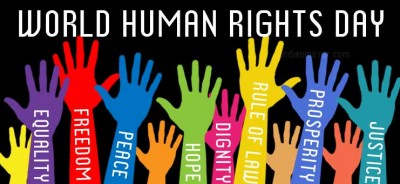Between Slogan and Achievement: International Human Rights Day

Having such occasions as International Human Rights Day always affords a mixed occasion. There is a sense by the promoters that the job is far from being done. But the worst tend to be those who nod at the concept while blithely ignoring it altogether. At heart, cynicism rules their roost, a sort of executive amorality.
On December 10, 1948, the Universal Declaration of Human Rights was adopted, becoming what was intended to be the preliminary foundations of an international bill of rights. Being a United Nations General Assembly deliberation, however, has always given it an aspirational, rather than binding flavour.
Collective enforcement of an effective scale at the international level would have to wait till the European Convention on Human Rights, and to a lesser extent the International Covenant on Civil and Political Rights coupled with the International Covenant on Economic and Cultural Rights.
Eleanor Roosevelt, main drafter, and chair of the UN Commission on Human Rights, highlighted the challenges with a symmetrical beauty. “Where, after all, do human rights begin? In small places, close to home – so close and so small that they cannot be seen on any maps of the world. Unless these rights have meaning there, they have little meaning anywhere. Without concerted citizen action to uphold them close to home, we shall look in vain for progress in the larger world.”
Rarely has such a profound statement on the necessity for action at the level of citizenry on the subject of human rights been expounded. But such actions require education, movement and action. More to the point, they seemingly require the warnings of existential horrors on vast scales. On the point of extinction, humans might well find resolve.
As Mary Ann Glendon, former US ambassador to the Holy See, surmised, “there was a time when men and women… at a time when much of the world was in ruins… were able to come together to articulate a path forward toward peace and justice”. In the ruins of 1945, there was a desperate impetus to, at the very least, outline the fundamentals.
Over its history, the UDHR has been maligned for its supposed relativism; adjusted to fit specific cultural interpretations (the Cairo Declaration of Human Rights comes to mind); and high jacked by moral crusaders intent on giving it an imperial flavour (regime change in Iraq 2003 and Libya in 2011 by way of examples). In Syria, the document is silent, subordinated to the bloody adventurism of proxy conflict and humanitarian catastrophe.
Governments supposedly strong on espousing human rights as platform and policy also fall foul on the issue in practice. Refugees continue in various parts of the world, notably wealthier ones, to be treated as a meddling nuisance rather than victims in need of relief.
Commercial diplomacy practiced by some governments continues to side step, sometimes with incredible clumsiness, human rights records that are more than a little bit smudged. What, for instance, to make of the trade deals between Saudi Arabia and the United Kingdom, for example, despite Riyadh’s ruthless air campaign in Yemen, helped along by British training and weaponry?
In Bahrain, British personnel continue to train security forces and prison officials accused of torture and the brutal suppression of protests.[1] The head of Britain’s diplomatic service, Simon McDonald, has openly admitted that “more resource is devoted… to prosperity than to human rights.” While the latter was followed, “it is not one of our top priorities.”[2]
Much of the enterprise in reminding the world of the existence of the UDHR has since become the sloganeering initiative of an “international human rights day”, treating their realisation as some endeavour of intervention on the part of the individual, or an easily realisable abstraction.
Complex questions have been left aside, and fetishism embraced. For outgoing UN Secretary General, Ban Ki-Moon, it was important to “stand up for someone’s rights today, tomorrow and everyday.”[3] This, at best, remains solemnly vague. There always varied means of standing up for anything.
The UN Commissioner for Human Rights, Zeid Ra’ad Al Hussein, as is often the case with such positions, sees the current global situation as particularly dangerous to human rights. Such dangers are naturally relative, and have always been. “We see human beings in pain. Decent values under attack. Messages of hatred and intolerance – divisive visions of the world which drive increasing selfishness, isolation, scapegoating [and] violence.”[4]
The Declaration, to that end, risks becoming a mere shelved document, even though it was acknowledged as a radical advance in international law. For the first time, a legal document had extracted the individual human from the purely State based nature of international sovereignty. It pointed a stern finger at the history of atrocities and state violence. It did so imperfectly, but the project was made clear. In being an aspiration, however, States were left to work out how, exactly, its provisions were to be realised.
The UN News Centre proudly stated that the Declaration had been recently translated into North Bolivian Quechua, bringing the number of translations of the document to over 500. But translations are one thing. Keeping the UNDHR a living thing is another, far more challenging prospect.
Dr. Binoy Kampmark was a Commonwealth Scholar at Selwyn College, Cambridge. He lectures at RMIT University, Melbourne. Email: [email protected]
Notes
[1] http://www.reprieve.org.uk/press/uk-trained-hundreds-of-guards-at-bahrains-death-row-prison-new-report-finds/
[2] https://www.politicshome.com/news/uk/foreign-affairs/news/81051/donald-trump-election-means-uk-no-longer-%E2%80%98-back-queue%E2%80%99-trade-deal
[3] http://www.un.org/apps/news/story.asp?NewsID=55769
[4] http://www.ohchr.org/EN/NewsEvents/Pages/HRDay2016.aspx

